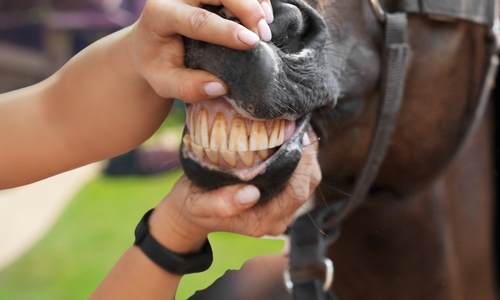
Horse’s teeth, unlike dogs and cats, continue to grow as long as there is a root structure supporting the teeth. As a result of the continuing growth, sharp enamel points arise on the sides of the molars and premolars. As a horse eats, the grinding of the food against the teeth wears down some of the sharp points. However, even a perfect mouth will get sharp points over time and need to have the edges removed through the use of a dental float.
What we offer and recommend at Mills Vet:
Comprehensive Dental Exams & Floats: Regular dental exams should be part of your horse’s annual check-up. Sedation and a dental speculum is used to thoroughly examine the teeth and oral tissues. Each exam presents an opportunity for preventative care, addressing issues early to avoid more serious problems. In addition to assessing if a float is needed, dental exams often identify tooth fractures, splinters, gaps between teeth causing feed packing and infection, and injuries to the cheek/ tongue tissue that require treatment. Dental exams also give us an opportunity to assess TMJ, poll and hyoid apparatus chiropractic restrictions. All of these abnormalities can be surprisingly easy to overlook without a full dental exam because as prey animals, horses are adept at hiding pain. At Mills Vet Services, we offer power floating for those horses with uneven dentition. Hand floating is also available and is often an excellent choice on horses with normal mouths on a good maintenance schedule. Care is taken always to maintain a balance between molar and incisor growth to maximize molar contact and dental care is tailored to your individual horse’s needs.
Why Float Your Horse’s Teeth?
-
Prevent Sharp Points: The horse’s narrow lower jaw can lead to sharp points developing on the edges of teeth as the horse chews, which cause painful damage to the cheeks and tongue. Routine floating smooths these points to prevent ulcers and discomfort.
-
Correct Imbalances: Overgrown or uneven teeth can cause significant pain and impact chewing and performance in the bridle. Untreated hooks and overgrowths can lead to infections and affect jaw function. Regular floats help maintain proper alignment and prevent these issues.
-
Age-Specific Dental Exam Recommendations:
-
Foals: Check for congenital defects and ensure proper tooth eruption.
-
Young Horses (2-5 years): Frequent exams help manage the transition from baby teeth to adult teeth, addressing issues early and keeping their mouth comfortable as they enter training.
-
Mature Horses: Annual exams are recommended, with floats performed if necessary. More frequent visits may be recommended if dental imbalances are present.
-
Senior Horses: Extra care is needed to manage periodontal disease, prevent tooth loss, and maintain chewing efficiency.
-
The Benefits:
-
Enhanced Comfort: Proper dental care ensures your horse is comfortable and can eat and work without pain.
-
Improved Performance: Healthy, comfortable teeth contribute to better feed utilization and ridden performance.
-
Longevity: With routine care, your horse can maintain functional teeth well into their 30s, enhancing their quality of life and maximizing how long they are able to chew their regular hay diet effectively.
Schedule Your Appointment Today! Whether you’re gearing up for riding and competition season, or winter is approaching with increased demands on your horse’s ability to hold weight, it’s the perfect time to ensure your horse’s dental health is in peak condition. Contact us to schedule a comprehensive dental exam to keep your equine companion performing at their best!
